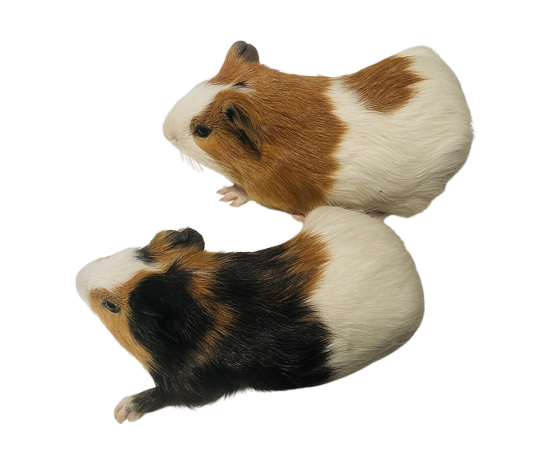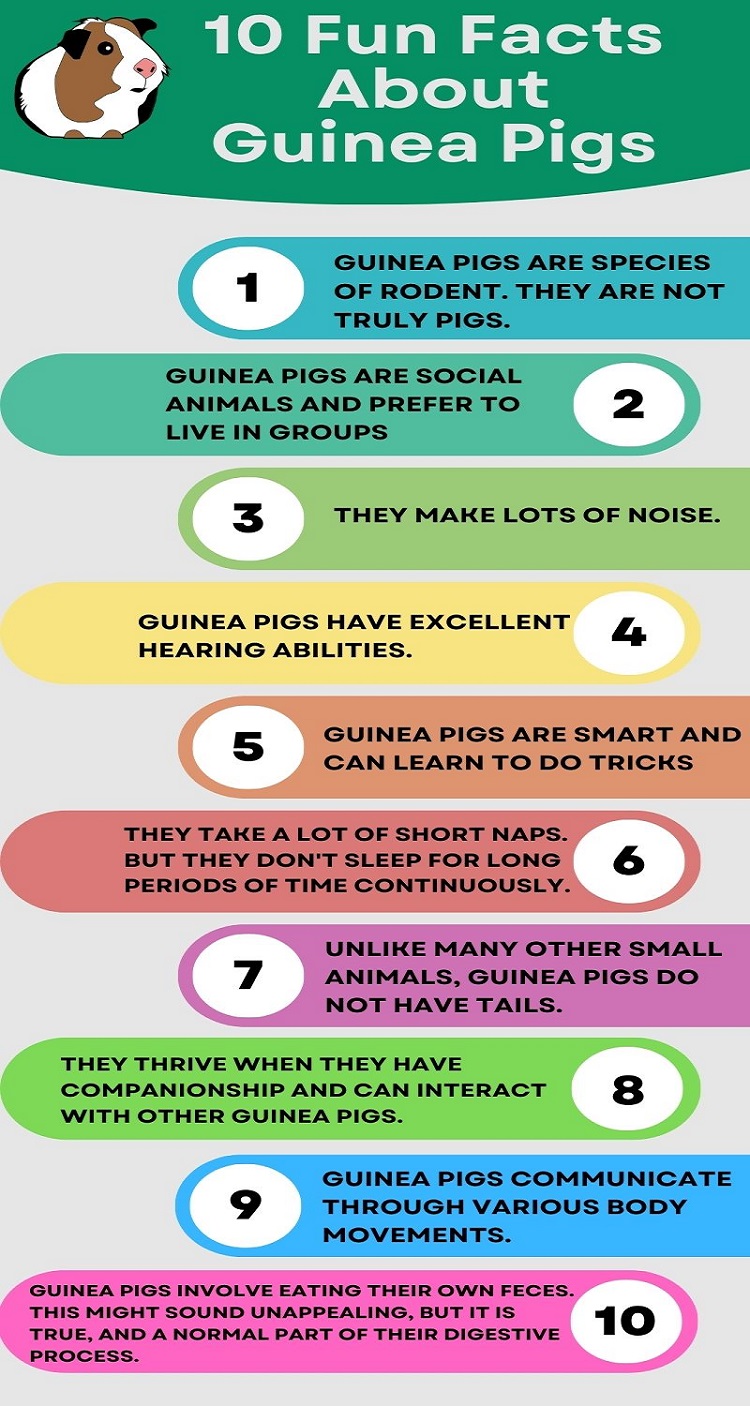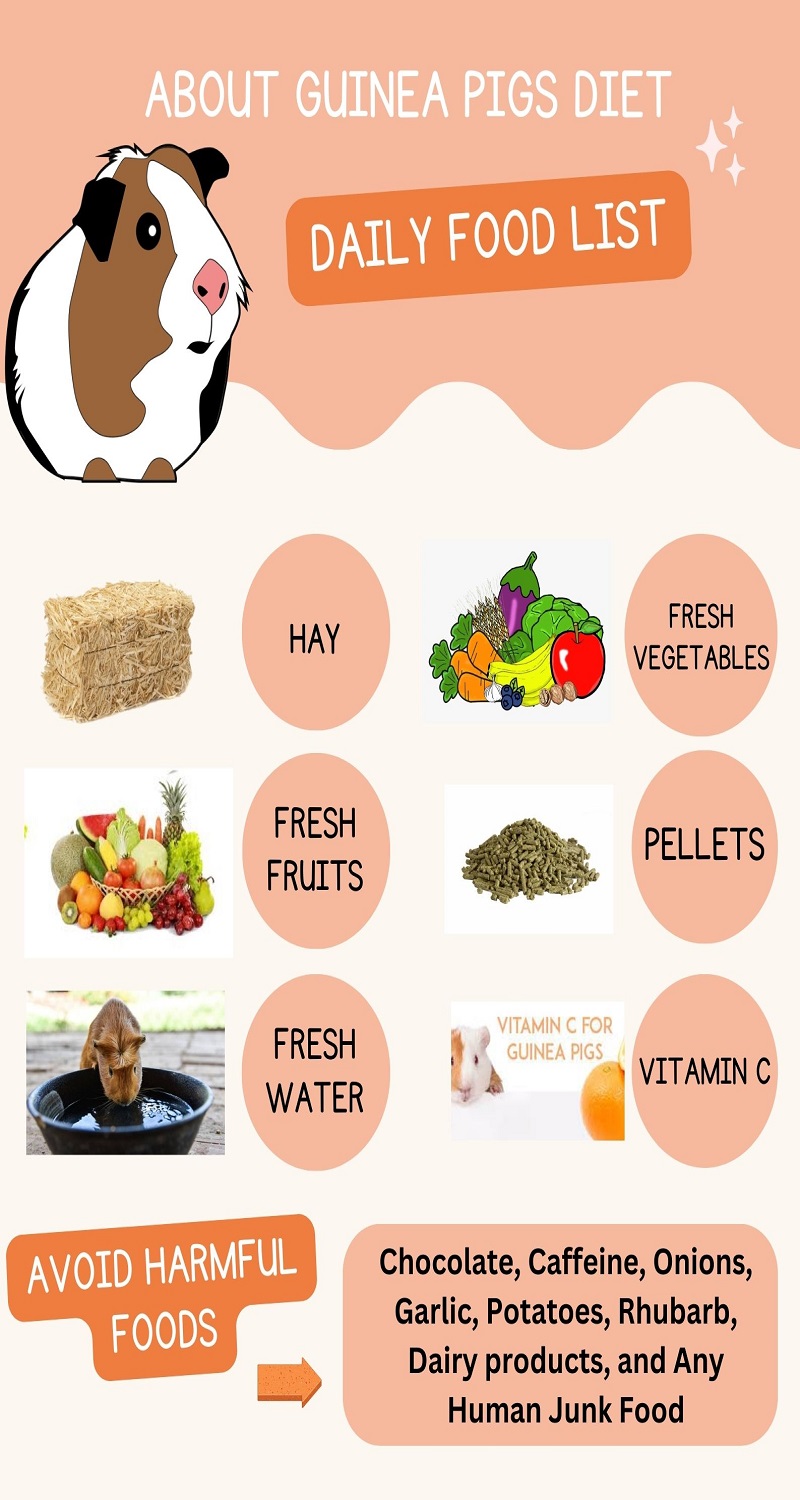About Guinea Pigs
Guinea pigs, also known as cavies, are adorable and sociable small mammals that have captured the hearts of pet lovers around the world.
Originating from the Andean region of South America, these charming creatures have become popular pets due to their gentle nature and unique characteristics.
Suppose you’re considering getting a guinea pig or already have one. In that case, there are several essential things to know about guinea pigs to ensure their well-being and happiness, such as their Breeds, companionship, bedding, housing, Grooming, food & nutrition, vocalizations & body language, behavior, characteristics, coat types, and temperaments.
A good name is also very important for your cavies. In the below article, I will discuss all guinea pigs in depth.
I am sure, after reading this full article, you will be able to maintain your guinea pigs better than yesterday because this article is full of useful information about guinea pigs. And all of the given information is from our real-life experience.
Things To Know About Guinea Pigs

Maybe you have a pair of guinea pigs on your own. But you may not know a lot of them. If you have any soft corners for guinea pigs and want to keep one as your pet, then you have to know about some important things.
You should know some important things about guinea pigs before adopting them. If you are interested in maintaining your guinea pig perfectly, then these things will surely help you a lot.
Appearance:
Guinea pigs are small, charming creatures with an endearing appearance that captivates many pet owners. They have a compact and rounded body shape, typically measuring between 8 to 12 inches in length.
Guinea pigs come in various breeds and coat types, each contributing to their unique visual appeal. Their coats can be short, smooth, long, flowing, or even hairless, depending on the breed. Guinea pigs exhibit a wide range of colors and patterns, including solid colors, bi-colors, tri-colors, and eye-catching combinations.
They have large, expressive eyes and cute, rounded ears that often flicker and swivel to capture sounds from their environment. Guinea pigs have a soft and gentle demeanor, adding to their overall charming and lovable appearance.
Whether they are sporting a sleek and glossy coat or a fluffy and textured one, guinea pigs are undeniably adorable pets that bring joy with their delightful appearance.
Behaviors:
Guinea pigs exhibit a range of adorable behaviors that make them captivating and cherished pets. They are social animals and thrive on companionship, often forming strong bonds with their human caregivers.
Guinea pigs communicate through a variety of vocalizations, from high-pitched squeaks of excitement to low rumbling purrs of contentment. Their playful and curious nature is often displayed through “popcorning,” where they jump and twist in the air when filled with joy.
Guinea pigs are naturally curious, enjoying exploratory activities and investigating their surroundings. They engage in nose twitching and whisker wiggling to gather sensory information. Chewing and gnawing are essential behaviors that help keep their continuously growing teeth in check.
Guinea pigs also appreciate hiding spots for security and may seek refuge in cozy hideouts or tunnels. Observing and understanding these behaviors allow us to provide a stimulating and nurturing environment for our guinea pig companions, fostering their happiness and well-being.
Nutrition:
Proper nutrition is crucial for guinea pigs to maintain optimal health. Their diet should consist of fresh hay, such as timothy or orchard grass, which aids in digestion and wears down their continuously growing teeth.
Alongside hay, guinea pigs need a balanced diet of high-quality pellets, fresh vegetables, and a limited amount of fruit. It’s important to avoid feeding them foods that are toxic to their sensitive digestive systems, such as chocolate, caffeine, and onions.
Vocalizations and Body Language:
Guinea pigs have unique vocalizations and body language to communicate their needs and emotions. Understanding their sounds, such as squeaks, purrs, and chatters, can help you decipher their moods and address any concerns promptly.
Additionally, regular handling and gentle interaction with your guinea pig will help them develop trust and build a strong bond with you.
Grooming:
Grooming is an essential aspect of caring for your guinea pig, ensuring their overall health, cleanliness, and well-being. Regular grooming sessions not only keep your furry friend looking their best but also provide an opportunity to bond with them.
Here are Some Important Aspects to Consider When It Comes to Grooming Your Guinea Pig:
Coat Care
Guinea pigs have different types of coats, ranging from short and smooth to long and curly. Regular brushing helps prevent matting and removes loose hair, keeping their coat clean and healthy.
A soft bristle brush or grooming mitt is suitable for short-haired guinea pigs, while long-haired guinea pigs may require additional tools like a comb or slicker brush to manage tangles and knots. Pay extra attention to their rear end and belly, as these areas are prone to accumulating debris.
Bathing
Guinea pigs generally do not require frequent baths unless they have soiled themselves or have a medical condition that necessitates it. If bathing is necessary, use a mild, specifically formulated guinea pig shampoo or a small amount of baby shampoo.
Ensure the water is lukewarm and gently wet, and lather their coat, taking care to avoid their face and ears. Rinse thoroughly and dry them with a towel or a hairdryer in a low, warm setting. It’s crucial to keep guinea pigs warm and dry after bathing to prevent chilling.
Nail Trimming
Guinea pigs’ nails can grow long and sharp, which can be uncomfortable for them and potentially cause injury. Regular nail trims are necessary to maintain their nail length. Use guinea pig-specific nail clippers or human nail clippers with caution.
Clip only the tip of the nail, avoiding the quick (a blood vessel inside the nail). If you’re unsure or uncomfortable doing this yourself, consult a veterinarian or a professional groomer for assistance.
Ear and Teeth Care
Inspect your guinea pig’s ears regularly for signs of redness, discharge, or mites. If you notice any abnormalities, consult a veterinarian. Guinea pigs have continuously growing teeth, so provide them with suitable chew toys and a balanced diet to keep their teeth worn down. Dental problems can arise if their teeth become overgrown, causing pain and difficulty in eating.
During grooming sessions, take the opportunity to check your guinea pig’s overall health, such as their eyes, nose, and skin. Look for any signs of illness, injury, or parasites. Gentle handling, speaking softly, and offering treats can help make Grooming a positive experience for your guinea pig.
One thing you should remember, each guinea pig is unique, and their grooming needs may vary. Pay attention to their individual requirements and consult a veterinarian if you have any concerns. Regular Grooming, combined with love and care, will help your guinea pig stay clean, healthy, and happy.
Most Popular Guinea Pigs Breeds
Guinea pig breeds encompass various appearances, coat types, and colors, making them a delightfully diverse group of pets.
Whether you’re a guinea pig enthusiast or considering getting one as a companion, familiarizing yourself with different guinea pig breeds can help you choose the perfect furry friend that suits your preferences.
Here are some popular guinea pig breeds worth exploring:
American: The American guinea pig is one of the most common breeds found as pets. It has a short, smooth coat and a stocky, compact body. Their coat colors range from solid colors to various patterns.
Abyssinian: Abyssinian guinea pigs are known for their unique and eye-catching coat. They have short, wiry fur that forms rosettes or swirls all over their body. Abyssinians come in various colors and patterns, creating a visually appealing look.
Silkie: Silkie guinea pigs have long, fine, and silky coat that gives them an elegant and graceful appearance. The hair falls straight down their body, often covering their eyes. Silkie guinea pigs are known for their docile and friendly temperament.
Rex: Rex guinea pigs have a dense, short, and curly coat that has a unique texture. The hairs stand up from the body, creating a plush and velvety appearance. They come in a variety of colors and are favored for their soft and cuddly feel.
Peruvian: The Peruvian guinea pig stands out for its long, luxurious coat that can grow up to 20 inches or more. Their hair flows down in sleek, straight locks, requiring regular Grooming and care to prevent matting.
Teddy: True to its name, the Teddy guinea pig has a dense and rough coat that resembles a teddy bear’s texture. The hair is short and curly, providing them with a unique appearance. Teddy guinea pigs come in various colors and patterns.
Skinny: The Skinny guinea pig is distinct for its lack of hair, with only a thin layer of fuzz or no hair at all. They have wrinkled and slightly folded skin, making them look different from other breeds. These guinea pigs require special care to protect their sensitive skin.
These are the most popular breeds of the many guinea pig breeds available. Each breed has its distinct characteristics, coat types, and temperaments, so it’s important to research and interact with different breeds to find the perfect match for you.
Remember that regardless of breed, guinea pigs are sociable creatures that thrive on their human companion’s love, care, and attention.
Companionship
First and foremost, guinea pigs are highly sociable animals that thrive on companionship. They are herd animals and prefer living with at least one other guinea pig for companionship.
A single guinea pig can become lonely and depressed, so it’s important to provide them with a suitable cage mate or spend ample time interacting with them daily.
Housing
Another important thing is housing for your guinea pig. You should know more about this matter. When it comes to housing, guinea pigs require spacious and well-ventilated cages to move around comfortably.
The enclosure should have solid flooring to protect their delicate feet and should be equipped with cozy bedding for them to burrow and nest. Regular cage cleaning is essential to maintain proper hygiene and prevent health issues.
Bedding
Choosing the right bedding for your guinea pig is crucial for their comfort and overall health. There are several options available, each with its own benefits. Aspen shavings provide a soft and absorbent surface, while paper-based bedding is environmentally friendly and dust-free.
Fleece bedding is soft and reusable, requiring regular washing. Care fresh bedding offers excellent absorbency and odor control. Additionally, hay can serve as both bedding and a source of nutrition for guinea pigs.
When selecting bedding, it’s important to consider factors such as absorbency, odor control, dust levels, and your guinea pig’s preferences. Regular cleaning and maintenance of the bedding are essential to ensure your furry friend’s clean and healthy living environment.
By providing them with the appropriate bedding, you can ensure that your guinea pig has a cozy and hygienic space to thrive in.
A Good Name
A good name for your guinea pig is necessary. Choosing something that reflects their adorable nature and unique personality is important. Consider names that are playful, endearing, and easy to pronounce. My guinea pig’s name is Max & Maya.
You can also choose any interesting name such as coco, poppy, honey, fluffy or more. Whether you opt for a nature-inspired moniker like Sunny or Daisy, or even a human-like name such as Charlie or Luna, a good name for your guinea pig is one that you find delightful and that suits their adorable presence in your life.
You should remember that male and female names should be different. Whatever, our naming section will help you most in this matter. You can visit here to find trendy and interesting names for your guinea pigs.
About Guinea Pigs History [Information About Guinea Pigs]
The guinea pig, also known as a cavy, has a rich and fascinating history that dates back thousands of years.
Originating from the Andes region of South America, specifically modern-day Peru, and Bolivia, guinea pigs were domesticated by the area’s indigenous people for both food and religious purposes.
They were raised as a food source due to their high protein content and docile nature. Guinea pigs were also culturally significant and often used in religious ceremonies and rituals.
With the arrival of Spanish conquistadors in the 16th century, guinea pigs were introduced to Europe and quickly gained popularity as exotic pets among the aristocracy.
They were selectively bred for various coat types and colors, developing different guinea pig breeds.
Today, guinea pigs are cherished worldwide as beloved pets and are appreciated for their gentle temperament, sociability, and charming personalities. Their history is a testament to their enduring companionship and cultural importance throughout the ages.
11 Cool Facts About Guinea Pigs
Guinea pigs have some unique cool facts. These important facts about guinea pigs highlight the unique characteristics and behaviors of guinea pigs, making them fascinating and delightful pets to have.
Below I have briefly discussed those cool facts.
1. Guinea Pigs Are Not True Pigs:
Despite their name, guinea pigs are not pigs and are not related to them. They belong to the rodent family, and their closest wild relatives are found in the Andes mountains of South America.
2. They Are Social Creatures:
Guinea pigs are highly social animals and thrive in the company of other guinea pigs. They communicate through various sounds like squealing, chirping, and purring.
3. Guinea Pigs Are Herbivores:
Guinea pigs cannot jump or climb very well unlike many small animals. They are herbivores and have a diet primarily composed of hay, fresh vegetables, and pellets.
4. Non-Jumping Pet Animal:
While guinea pigs are not known for their jumping abilities, they can jump to some extent. However, their jumping range is relatively limited compared to other small animals.
Guinea pigs are generally more inclined to explore their surroundings by running and exploring on the ground rather than engaging in extensive jumping or climbing activities.
5. They Are Prolific Breeders:
Female guinea pigs have a relatively short gestation period of about 59 to 72 days, and they can have multiple litters per year. A single litter can consist of up to 5 or 6 pups.
6. They Also Have Unique Vocalizations:
Guinea pigs have a wide range of vocalizations that express different emotions. They can “wheek” when excited or hungry, “purr” when content, and “chatter” their teeth when they feel threatened.
They also Rumble during social interactions or when they are preparing for a confrontation, whining or whistling sounds when they are in pain or discomfort. They may chatter with their teeth as a defensive response. Sometimes they make soft, melodic cooing sounds, particularly when they are bonding with their human companions.
7. The Teeth Of Guinea Pigs Continuously Grow:
Guinea pigs have continuously growing teeth, and they must regularly chew on things to wear them down. This is why providing them with hay or safe chew toys is essential for their dental health.
8. They Are Sensitive to Heat:
Guinea pigs are more sensitive to heat than cold. Their ideal temperature range is between 65°F and 75°F (18°C and 24°C), so it’s important to keep them in a cool environment and avoid direct sunlight.
9. Excellent Communicators:
Guinea pigs have an impressive ability to communicate with their human caretakers. With time and patience, they can learn to recognize their names, respond to commands, and even be trained to perform simple tricks.
10. Guinea Pigs Have Longevity:
With proper care, guinea pigs can live for an average of 5 to 7 years, although some can reach up to 8 years or more. Providing a balanced diet, a clean living environment, and regular veterinary check-ups can help promote a long and healthy life.
11. Nocturnal Napping:
Guinea pigs are crepuscular, which means they are most active during dawn and dusk. They often take short naps throughout the day and night, totaling around 4 hours of sleep in 24 hours.
10 Fun Facts About Guinea Pigs
Guinea pigs have a lot of fun facts. These fun facts highlight guinea pigs’ delightful and intriguing aspects, making them fascinating and lovable companions.
I discussed 10 fun and amazing facts about guinea pigs.

- Guinea pigs are species of rodent. They are not truly pigs.
- Guinea pigs are social animals and prefer to live in groups.
- They make lots of noise.
- Guinea pigs have excellent hearing abilities.
- Guinea pigs are smart and can learn to do tricks.
- They take a lot of short naps. But they don’t sleep for long periods continuously.
- Unlike many other small animals, guinea pigs do not have tails.
- They thrive when they have companionship and can interact with other guinea pigs.
- Guinea pigs communicate through various body movements.
- Guinea pigs involve eating their own feces. This might sound unappealing, but it is true, and a normal part of their digestive process.
Good and Bad Things About Guinea Pigs
Though guinea pig is a pet animal but it has some good things that you may like and also some bad things that you may dislike.
Below I have discussed some pros and cons of guinea pigs. I hope you will like these.
| Pros | Cons |
|
Guinea pigs are generally gentle and friendly, making them great companions for children and adults. |
Guinea pigs can be prone to certain health issues, such as respiratory infections, dental problems, and vitamin C deficiency. Regular veterinary check-ups and a proper diet are crucial for their well-being. |
|
With their round bodies, cute faces, and expressive eyes, guinea pigs are undeniably adorable pets that can bring joy and happiness to your home. |
Guinea pigs have a distinct odor that requires regular cage cleaning to maintain a fresh and hygienic environment. Their bedding and litter should be changed frequently to minimize odor. |
|
Guinea pigs are typically docile and can be easily handled, making them a good choice for first-time pet owners or those looking for a low-maintenance pet. |
Guinea pigs need adequate space to live comfortably. Their cages should be spacious enough to accommodate exercise and play, as well as provide hiding spots and enrichment. |
|
Guinea pigs are known for their playful personalities and can provide hours of entertainment as they explore, run, and interact with toys and their environment. |
While guinea pigs can provide companionship for several years, their lifespan is relatively shorter than others. This may lead to heartache for owners when they eventually reach the end of their life. |
|
Guinea pigs have various vocalizations, allowing them to express their needs, desires, and emotions. Their sounds can be endearing and provide insights into their well-being. |
Some individuals may develop allergies to guinea pigs, particularly to their fur or bedding materials. It’s important to be aware of potential allergies before bringing a guinea pig into your home. |
About Guinea Pigs Diet
One crucial aspect of guinea pig’s care is ensuring a proper diet. A guinea pig’s diet should consist of a balanced and nutritious selection of foods to promote overall health and well-being.
Let’s explore the key components of a guinea pig’s diet.

Hay: The foundation of a guinea pig’s diet is high-quality hay, such as Timothy hay. Hay is essential for proper digestion, dental health, and healthy weight. It provides the necessary fiber that helps prevent digestive issues and keeps teeth in good condition. Guinea pigs should have access to fresh hay at all times.
Fresh Vegetables: Guinea pigs require a variety of fresh vegetables to obtain essential vitamins and minerals. Suitable veggies include romaine lettuce, bell peppers, cucumbers, carrots, spinach, and kale. Introduce new vegetables gradually to prevent digestive upset, and always wash them thoroughly before feeding.
Fresh Fruits: While fruits should be given in moderation due to their high sugar content, they can be offered as occasional treats. Good choices include apples, strawberries, blueberries, melons, and oranges. Remove any seeds or pits before offering fruits to prevent choking hazards.
Pellets: Guinea pig pellets provide additional nutrition and should be formulated specifically for guinea pigs. Look for high-quality pellets which are free from nuts and seeds, as these can harm them. Pellets should be offered in limited quantities as they are calorie-dense, typically a tablespoon per day per adult guinea pig.
Fresh Water: Fresh, clean water must always be available to guinea pigs. Ensure they have a water bottle or a suitable water dispenser that is cleaned regularly. Check the water supply daily to ensure it hasn’t run out or become contaminated.
Vitamin C: Guinea pigs, unlike humans, cannot synthesize their vitamin C, so they need a dietary source of this essential nutrient. Please provide them with fresh fruits and vegetables rich in vitamin C, such as bell peppers, kale, oranges. Alternatively, you can offer vitamin C supplements specifically formulated for guinea pigs, but consult a veterinarian for proper dosage.
Avoid Harmful Foods: Certain foods are toxic or harmful to guinea pigs and should be strictly avoided. These include chocolate, caffeine, onions, garlic, potatoes, rhubarb, dairy products, and human junk food. Also, avoid feeding them grass clippings or plants from the garden, as they may have been treated with pesticides or contain harmful substances.
Guinea Pig Daily Care Checklist
Here is the guinea pig daily care checklist:

About How Long Do Guinea Pigs Live For?
Guinea pigs have a relatively long lifespan compared to other small mammals, which makes them great companions for many years.
Generally, guinea pigs live for about 5 to 7 years, although some can live longer with proper care and a healthy lifestyle.
Several factors can influence the lifespan of a guinea pig. Genetics plays a role, as some breeds are known to have longer lifespans than others.
Additionally, the overall health and well-being of the guinea pig, including its diet, exercise, and living conditions, can significantly impact its longevity.
Final Words
Guinea pigs are wonderful pets that require specific care and attention to thrive. You can ensure that your guinea pig leads a happy and healthy life by providing them with companionship, a suitable living environment, a balanced diet, and understanding their unique communication cues.
So, if you’re ready to embark on an exciting journey of guinea pig ownership, armed with these essential insights, you’ll be well-prepared to provide the best care for your furry friend.
